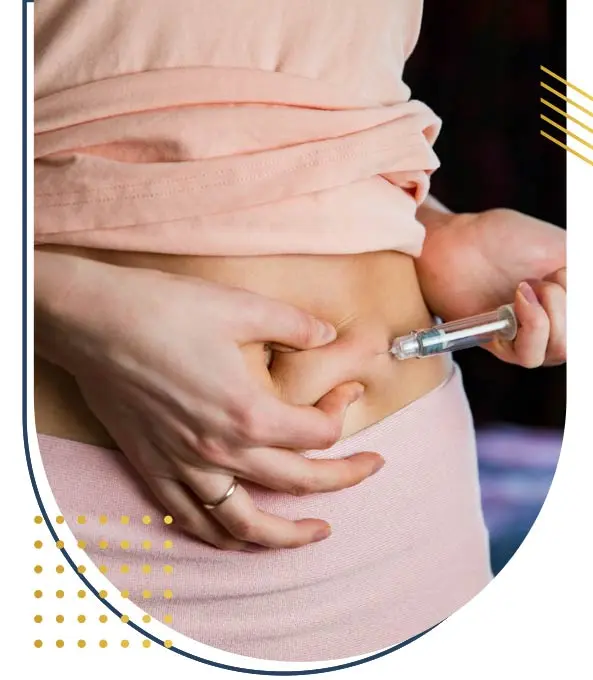
Intrauterine insemination (IUI) realized in Egypt is a medically assisted reproduction technique that consists of introducing the partner's sperm directly into the uterus. This sperm must be prepared in a laboratory to eliminate toxic components and the woman is often, but not always under hormonal stimulation to synchronize ovulation with insemination.
This technique is an effective solution for infertile couples to allow them to have a baby and be parents.
Intrauterine insemination price in Egypt
To have the price intrauterine insemination Egypt, you can ask for a free online quote by filling in the quotation request form on our website or contact us by phone to be in a direct contact with one of our counselors to obtain intrauterine insemination cost Egypt and to have more details about this technique.
What are the types of the Intrauterine insemination procedure ?
Natural Cycle IUI :
Natural cycle IUI involves monitoring a woman's menstrual cycle without the use of fertility medications. This approach relies solely on the body's natural hormonal fluctuations to determine the optimal time for insemination.
It typically begins with tracking the woman's menstrual cycle to identify the time of ovulation. Once ovulation is detected, a sample of washed sperm is inserted directly into the uterus via a thin catheter.
This method is often preferred by individuals who wish to avoid the use of fertility drugs due to personal or medical reasons. It offers a more natural approach to conception, although success rates may vary depending on factors such as the woman's age and fertility status.
The process of natural cycle IUI involves close monitoring of the woman's menstrual cycle through various methods such as ultrasound scans and ovulation predictor kits. This allows healthcare providers to pinpoint the most fertile window for insemination accurately.
Timing is crucial in natural cycle IUI, as sperm must be present in the reproductive tract at the time of ovulation to maximize the chances of fertilization. While this method avoids the potential side effects and costs associated with fertility medications, it may not be suitable for individuals with irregular menstrual cycles or ovulation disorders.
Success rates for natural cycle IUI tend to be lower compared to stimulated cycles, but it remains a viable option for couples seeking a less invasive approach to fertility treatment.

Stimulated Cycle IUI :
Stimulated cycle IUI involves the use of fertility medications to stimulate the ovaries and increase the chances of successful ovulation and conception.
This method is commonly employed when natural ovulation is irregular or insufficient for optimal fertility.
The process typically begins with the administration of medications such as clomiphene citrate or gonadotropins to promote the development of multiple follicles in the ovaries. Monitoring of the ovarian response is conducted through ultrasound scans and hormone level assessments to determine the timing of insemination.
Once the follicles reach an optimal size, a trigger injection of human chorionic gonadotropin (hCG) is administered to induce ovulation.
The insemination procedure is then scheduled to coincide with the anticipated time of ovulation, usually within 24 to 36 hours after the hCG injection. A sample of washed sperm is carefully deposited into the uterus via a catheter, increasing the likelihood of sperm reaching and fertilizing the released egg.
Stimulated cycle IUI offers higher success rates compared to natural cycle IUI, particularly in cases of ovulatory dysfunction or unexplained infertility. However, it may entail a greater risk of multiple pregnancies due to the stimulation of multiple follicles.
Despite its effectiveness, stimulated cycle IUI requires close monitoring by fertility specialists to minimize the risk of complications such as ovarian hyperstimulation syndrome (OHSS) and multiple gestations.
Patients undergoing this treatment may also experience side effects associated with fertility medications, including hot flashes, mood swings, and ovarian discomfort.
Nevertheless, stimulated cycle IUI remains a valuable option for couples seeking assisted reproduction and can significantly enhance their chances of achieving pregnancy.
Donor Sperm IUI :
Donor sperm IUI involves the use of sperm from a sperm donor to facilitate conception in cases where male factor infertility or genetic concerns prevent the use of the male partner's sperm.
This method offers a viable solution for single women, same-sex female couples, or heterosexual couples facing severe male infertility.
The process begins with the selection of a suitable sperm donor through a licensed sperm bank or fertility clinic, taking into account factors such as the donor's medical history, genetic screening, and physical characteristics.
Once a donor is chosen, the sperm sample is thawed and processed to remove seminal fluid and other impurities, leaving behind a concentrated sample of healthy sperm.
The timing of insemination follows a similar protocol to traditional IUI, with the prepared sperm being inserted directly into the uterus during the woman's fertile window. Donor sperm IUI allows individuals and couples to pursue parenthood with the assistance of reproductive technology, bypassing obstacles posed by male infertility or genetic disorders.
While donor sperm IUI offers a promising pathway to conception, it raises ethical, legal, and emotional considerations for prospective parents. Counseling and support services are often provided to address concerns related to donor anonymity, disclosure to offspring, and family dynamics.
Additionally, the use of donor sperm may involve complex legal agreements to establish parental rights and responsibilities. Despite these challenges, donor sperm IUI has enabled countless individuals and couples to fulfill their dreams of starting a family, showcasing the transformative power of assisted reproductive technologies.
Frozen-Thawed Sperm IUI :
Frozen-thawed sperm IUI involves the use of cryopreserved sperm samples for insemination, offering flexibility and convenience for couples undergoing fertility treatment. This method is particularly beneficial for individuals requiring multiple insemination cycles or those facing logistical challenges with fresh sperm donation.
The process begins with the selection of a suitable sperm donor or the collection of sperm from the male partner, followed by cryopreservation to preserve sperm viability for future use.
When ready for insemination, the frozen sperm sample is thawed and prepared using specialized techniques to enhance motility and survival rates.
The timing of insemination is carefully coordinated with the woman's ovulation cycle, ensuring optimal conditions for fertilization. Frozen-thawed sperm IUI provides a reliable alternative to traditional insemination methods, allowing couples to overcome barriers such as travel constraints, scheduling conflicts, or limited availability of fresh sperm donors.
Despite its advantages, frozen-thawed sperm IUI may be associated with slightly lower success rates compared to fresh sperm insemination due to potential damage to sperm cells during the freezing and thawing process. However, advances in cryopreservation techniques and sperm handling protocols have significantly improved the viability and success rates of frozen sperm samples in recent years.
Additionally, frozen-thawed sperm IUI offers increased flexibility in treatment planning and can be seamlessly integrated into assisted reproductive cycles, offering hope and options to couples pursuing fertility treatment.
Washed Sperm IUI :
Washed sperm IUI involves the preparation of sperm samples to remove seminal fluid and other contaminants, optimizing the quality and concentration of sperm for insemination. This method is commonly employed to improve the effectiveness of sperm delivery and enhance the chances of successful fertilization.
The process begins with the collection of a semen sample from the male partner or a sperm donor, which is then subjected to a series of washing and centrifugation steps to separate motile sperm from non-sperm components.
The washed sperm is carefully suspended in a nutrient-rich medium to maintain viability and mobility until the time of insemination.
This concentrated sperm sample is then introduced into the uterus via a catheter, ensuring direct placement near the fallopian tubes where fertilization occurs. Washed sperm IUI offers several advantages over traditional insemination methods, including reduced risk of uterine cramping, decreased exposure to potentially harmful substances in seminal fluid, and improved sperm motility.
By eliminating impurities and debris from the sperm sample, washed sperm IUI enhances the likelihood of successful fertilization and embryo development.
This method is particularly beneficial for couples with male factor infertility or those undergoing assisted reproductive procedures such as intrauterine insemination or in vitro fertilization (IVF). Additionally, washed sperm IUI can be combined with other fertility treatments to maximize the chances of conception, providing a comprehensive approach to infertility management.
Who is suitable for intrauterine insemination Egypt
Intrauterine insemination Egypt is recommended in cases of pregnancy failure despite ovulation, anovulatory cycle despite ovarian stimulation treatments, endometriosis, ovarian insufficiency, unexplained infertility.
It is also indicated in the case of a severe to moderate male infertility, if the quality of the sperm is reduced and its quantity is too low, if the cervical mucus is abnormal, if there are antibodies against spermatozoa.
You can opt for intrauterine insemination when there are physical problems related to sexual intercourses such as: Vaginismus which may prevent some women from having frequent sexual intercourses.
Before intrauterine insemination
Before intrauterine insemination Egypt, you must consult your gynaecologist to examine you and prescribe you the medical examinations you will have to do, he will also speak with you, ask you questions and inform you about the steps of this procedure, you will also tell him if you are suffering from certains diseases (you and your partner) or whether you are taking some medications or not.
The medical examinations that must be done are as follow :
- Hormonal checkup
- Clinical examination
- A test of serologies
- a spermogram for men
Ovulation Induction or Cycle Monitoring :
Depending on the individual's fertility status, ovulation induction or cycle monitoring may be initiated to optimize the timing of IUI.
Ovulation induction involves the use of fertility medications such as clomiphene citrate or gonadotropins to stimulate the development and release of mature eggs (follicles) from the ovaries. Alternatively, cycle monitoring may be employed for individuals with regular ovulatory cycles, involving close tracking of natural ovulation using methods such as ultrasound scans and ovulation predictor kits.
Semen Preparation and Sperm Washing :
Prior to the insemination procedure, the sperm sample (whether from the male partner or a donor) undergoes processing and preparation to enhance its quality and concentration.
This process, known as sperm washing, involves the removal of seminal fluid and other contaminants from the sperm sample to isolate motile and viable sperm cells. Sperm washing is typically performed using specialized techniques and culture media under controlled laboratory conditions to ensure optimal sperm quality for insemination.
Timing of Insemination :
Timing is critical in IUI to maximize the chances of successful fertilization. Insemination is typically scheduled to coincide with the woman's ovulation window, which is determined based on the results of ovulation monitoring or the administration of ovulation-inducing medications. The timing of insemination may vary depending on factors such as follicle size, hormone levels, and the individual's response to fertility medications.
In some cases, a trigger injection of human chorionic gonadotropin (hCG) may be administered to induce ovulation and synchronize the timing of insemination.
Cervical Preparation :
In some cases, cervical preparation techniques may be employed to facilitate the passage of sperm into the uterus during the insemination procedure. This may involve the administration of medications such as estrogen or a cervical dilator to soften and dilate the cervix, making it more receptive to the catheter used for insemination.
Cervical preparation is typically recommended for individuals with cervical factors affecting sperm transport or in cases where previous insemination attempts have been unsuccessful.
Lifestyle Modifications :
Leading a healthy lifestyle can positively impact fertility and the success of IUI treatment. Patients are often advised to maintain a balanced diet, engage in regular exercise, manage stress levels, and avoid harmful substances such as tobacco, alcohol, and recreational drugs. Additionally, certain dietary supplements or vitamins may be recommended to support reproductive health and optimize fertility outcomes.
Making lifestyle modifications prior to undergoing IUI can help improve overall well-being and enhance the chances of conception.
Emotional Support and Counseling :
undergoing fertility treatment can be emotionally challenging, and it's essential to prioritize emotional well-being throughout the process.
Patients are encouraged to seek support from their healthcare team, loved ones, or support groups specializing in infertility. Counseling services may also be available to address any concerns, fears, or anxieties related to fertility treatment and help patients cope with the emotional rollercoaster of the journey.
Open communication and a supportive network can greatly alleviate stress and enhance resilience during the IUI process.
How is it performed ?
Your doctor will indicate you the best time to have this injection and insemination.
He will also tell you if you can also have sexual intercourses.
Time of ovulation :
Insemination should take place just before ovulation to optimize the chances of fertilization. There are several methods for determining ovulation.
It can be determined by ultrasound and blood or urine tests (ovulation tests) that you can get at a pharmacy. Your doctor will determine the most appropriate method.
Execution :
The man provides a semen sample to the laboratory where it will be prepared.
The doctor slides a small, flexible tube through a speculum into the uterus and then slowly deposits the sperm into the uterus. This procedure is usually painless and lasts less about 20 minutes.
There are usually no contraindications to have sexual intercourses shortly after the insemination.
After intrauterine insemination Egypt
After your intrauterine insemination Egypt, your doctor will ask you to do a pregnancy test two weeks after this intrauterine insemination procedure and in case of delayed menstruations.
If the result of the test is positive, you will have to redo it 2 days after (48 hours later) and a blood test and then your doctor will ask you to do an ultrasound at 4 weeks of pregnancy.
If the result is negative you will reconsult your doctor for other treatments.
The long-term healing period following an intrauterine insemination.
Monitoring and Follow-Up :
After undergoing an IUI procedure, patients typically undergo regular monitoring and follow-up appointments with their fertility specialist or reproductive endocrinologist. These appointments allow healthcare providers to assess the outcome of the procedure, monitor ovarian response, and track reproductive hormone levels.
Additional diagnostic tests such as ultrasound scans and blood work may be performed to evaluate the health of the reproductive organs and identify any potential issues that may affect future fertility.
Continued Fertility Treatment
For some individuals or couples, achieving pregnancy may require multiple cycles of IUI or additional fertility treatments such as in vitro fertilization (IVF).
The long-term healing period may involve ongoing fertility treatment plans tailored to the specific needs and circumstances of the patient. This may include adjustments to medication protocols, optimization of timing for insemination, or exploration of alternative treatment options based on the response to previous cycles of IUI.
Lifestyle Modifications and Support :
Adopting a healthy lifestyle remains crucial during the long-term healing period after IUI to support reproductive health and optimize fertility outcomes.
Patients are encouraged to maintain a balanced diet, engage in regular exercise, manage stress levels, and avoid harmful substances such as tobacco, alcohol, and recreational drugs. Additionally, seeking emotional support from loved ones, support groups, or counseling services can help alleviate stress and anxiety associated with fertility treatment and promote overall well-being.
Addressing Underlying Fertility Issues :
In cases where underlying fertility issues contribute to infertility, addressing these issues may be essential for long-term healing and successful conception.
This may involve further diagnostic testing to identify the root cause of infertility, such as hormonal imbalances, ovulatory disorders, or male factor infertility. Based on the findings, targeted treatment approaches or interventions may be recommended to address these underlying issues and optimize reproductive function.
Exploring Alternative Paths to Parenthood :
While IUI offers a valuable option for couples seeking assisted reproduction, exploring alternative paths to parenthood may be part of the long-term healing process for individuals facing challenges with fertility.
This may include options such as adoption, surrogacy, or donor gametes (eggs or sperm). Exploring these alternatives can provide hope and opportunities for building a family while navigating the complexities of infertility.
Embracing Patience and Resilience :
The journey towards parenthood often requires patience, resilience, and perseverance. The long-term healing period after IUI may involve navigating ups and downs, setbacks, and uncertainties along the way.
Embracing patience and resilience can help individuals and couples stay focused on their goals, maintain a positive outlook, and continue pursuing avenues for achieving their dreams of starting or expanding their family.

The results
The chances of success of intrauterine insemination Egypt depend on several factors including the woman's age and the cause of the fertility problem. Most pregnancies occur within the first 3 treatments. Generally, 3 to 6 treatments are performed.
This technique is very common as it is effective and allows infertile couples to have a baby.
Intrauterine insemination Egypt :its advantages
Intrauterine insemination Egypt has several advantages :
- It is a less invasive procedure compared to other fertility treatments
- Its chances are very high
- Semen is collected and washed and its quality is improved
- It is the closest method to natural conception as the sperm is inserted artificially and directly into the uterus
- The duration of the procedure is short (about 20 minutes) and then you will be asked to stay in the recovery room
- It is not painful
- It is a very simple technique
- It does not need anaesthesia and thus the patient will not be stressed.

